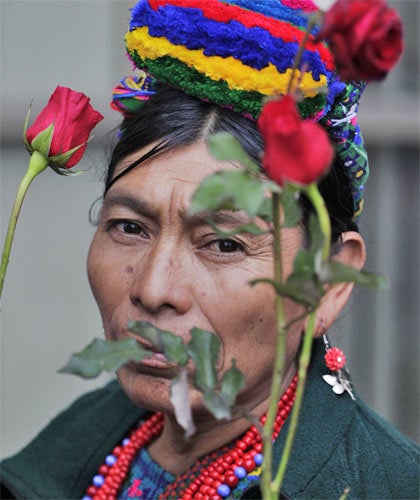Your support helps us to tell the story
From reproductive rights to climate change to Big Tech, The Independent is on the ground when the story is developing. Whether it's investigating the financials of Elon Musk's pro-Trump PAC or producing our latest documentary, 'The A Word', which shines a light on the American women fighting for reproductive rights, we know how important it is to parse out the facts from the messaging.
At such a critical moment in US history, we need reporters on the ground. Your donation allows us to keep sending journalists to speak to both sides of the story.
The Independent is trusted by Americans across the entire political spectrum. And unlike many other quality news outlets, we choose not to lock Americans out of our reporting and analysis with paywalls. We believe quality journalism should be available to everyone, paid for by those who can afford it.
Your support makes all the difference.A court in Guatemala has sentenced four retired army officers to each serve 6,060 years in prison for carrying out one of the most notorious atrocities in the country's 36-year civil war. The men were given 30 years for each of the 201 people confirmed dead in the 1982 massacre at Las Dos Erres, a village in the north of the country. Another 30 years was added to their jail term for crimes against human rights.
It was the first time that soldiers have been convicted of abuses during the notoriously brutal conflict, which ran from 1960 to 1996 and pitched left-wing revolutionaries against a right-leaning military junta that had seized control of the country in a 1954 coup.
The four men – Carlos Carias, Manuel Pop, Reyes Collin Gualip and Daniel Martinez Hernandez – were among 17 members of an élite special forces unit called the Kaibiles, which attacked the village before dawn on 7 December 1982 looking for missing weapons that had been stolen by rebels days earlier.
Having accused locals of collaborating with the guerrillas, the Kaibiles shot, strangled, and bludgeoned scores of villagers to death over the course of three days. Dozens of bodies were thrown down a well, women and small girls were raped, and several victims were beaten to death with a sledgehammer.
Afterwards, the remains of 171 locals were recovered, including those of 67 children under the age of 12. Although the official death toll was 201, victims have insisted that the real figure was closer to 250.
It was the second massacre trial carried out under the centre-left President Alvaro Colom. Human-rights groups hope it will help heal the wounds of the Cold War-era civil war and signal an end to Guatemala's culture of impunity.
Outside the court in Guatemala City, survivors cried when the sentences were announced and spelled the word "justice" on the ground with red rose petals. "We waited many years," Raul de Jesus Gomez told The Associated Press. "I saw when they were killing people. They had us kneeling for five hours and would put their rifles in our mouths every time we asked them to stop killing the others."
A group of the relatives of the accused soldiers shouted that the court was biased, saying the men were only following orders from Efrain Rios Montt, the country's former military dictator. Carias called his sentence "unjust". He did not confirm or deny that the former leader, who is now 85, ordered the attack, but said: "I would risk my life again for that honourable institution that is the Army."

Join our commenting forum
Join thought-provoking conversations, follow other Independent readers and see their replies
Comments